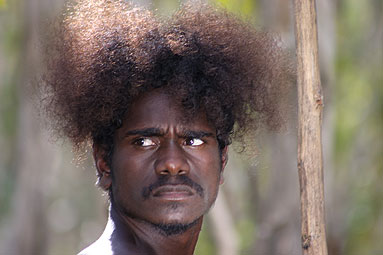
An airborne camera tracks along a pristine river lined with verdant trees, while a narrator begins, “Once upon a time,” and then laughs at his private joke. This isn’t going to be one of those kinds of stories, he tells us.
By “those kind” I suppose he means Western fairy tales, and while the story he tells doesn’t have a prince or princess or wicked witch, and while it lacks the touch of the Brothers Grimm or the stink of Disney, it’s not far off from a fairy tale either.
It is, after all, a story handed down from generation to generation, it just comes from a very different story-telling tradition than those that begin with the words “Once upon a time” and end with “and they all lived happily ever after.”
The narrator is David Gulpilil (of Rabbit-Proof Fence), and in a clear, easygoing English, he tells us a little about his land, Australia, and his people, the ones who were there before the Europeans.
From there he dives into his story, one of his ancestors. A ten-man hunting party is building canoes to search for goose eggs, and among them are a pair of brothers, the younger of which is jealous of the older brother’s wives.
So the older one tells the younger one (and us) a story of their ancestors, who included two brothers in a similar situation.
It’s a story within a story within a story (got all that?), and director Rolf de Heer elegantly blends oral tradition style story-telling with film-making, keeping the divisions between the nesting narratives clear by switching from color to black and white and then back to color the deeper into the stories we get.
The setting may seem rather alien, considering that the original story is set so far back in time the tellers aren’t even sure exactly how old it is. And all of the actors are Aboriginal, all of the dialogue delivered in their original languages. And yet it’s surprisingly full of drama and humor, much of which tends toward the base (dick jokes, yapping wives that never shut up, etc).
It’s such an incredibly unique film—in look, form and the specifics of the subject matter— that its incredible accessibility is as unexpected as it is welcome.
Ten Canoes screens Thursday and Friday, September 6 and 7, at 7 p.m. at the Wexner Center for the Arts’ Film/Video theater. For more info, click to wexarts.org
